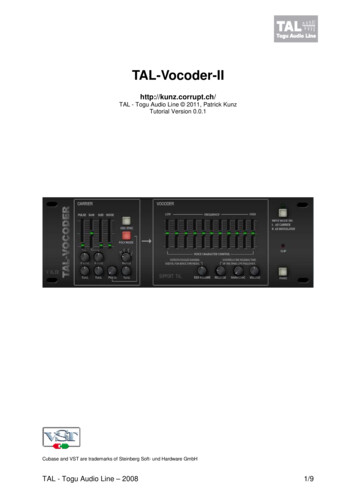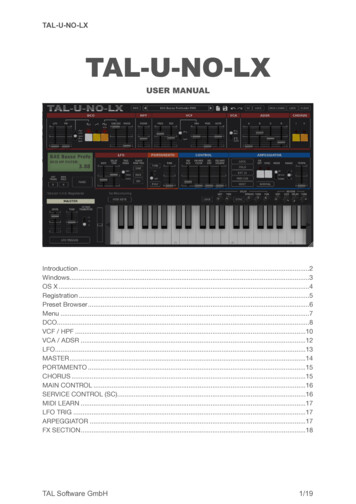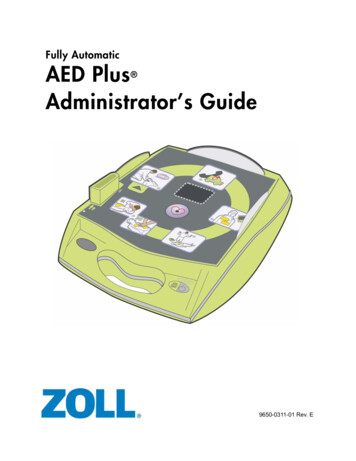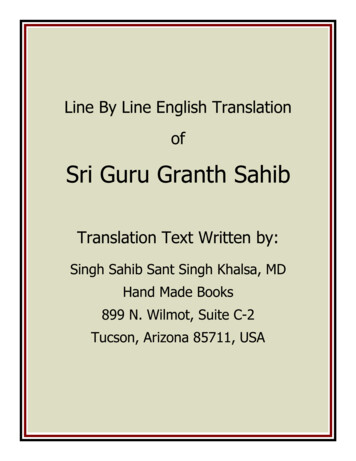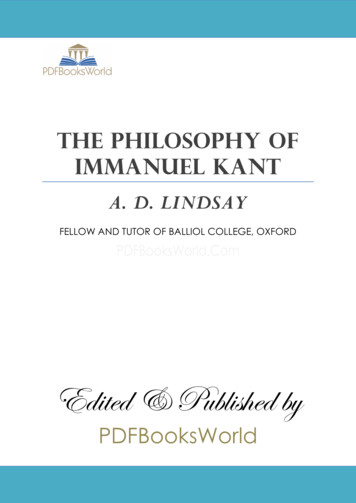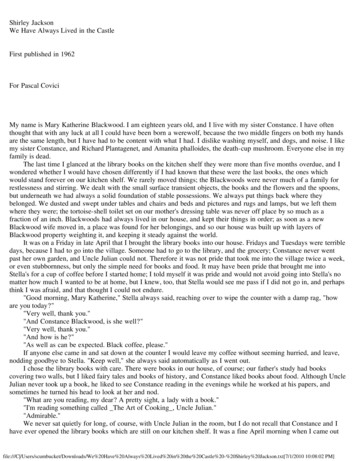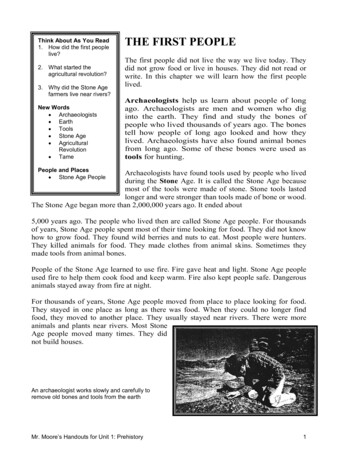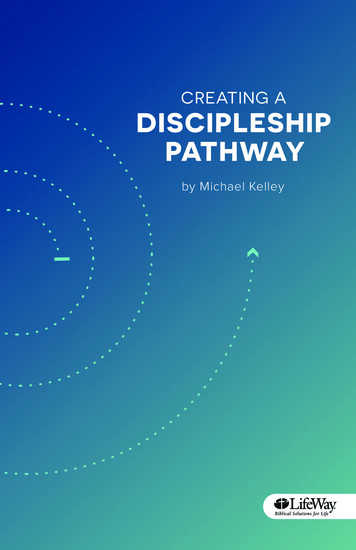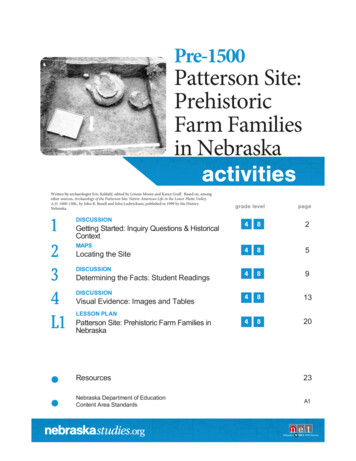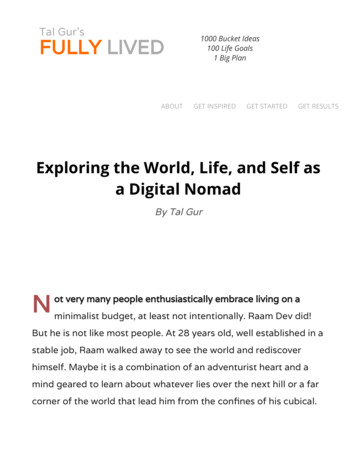
Transcription
Tal Gur'sFULLY LIVEDABOUT1000 Bucket Ideas100 Life Goals1 Big PlanGET INSPIREDGET STARTEDGET RESULTSExploring the World, Life, and Self asa Digital NomadBy Tal GurNot very many people enthusiastically embrace living on aminimalist budget, at least not intentionally. Raam Dev did!But he is not like most people. At 28 years old, well established in astable job, Raam walked away to see the world and rediscoverhimself. Maybe it is a combination of an adventurist heart and amind geared to learn about whatever lies over the next hill or a farcorner of the world that lead him from the con nes of his cubical.
Raam grew up in rural Massachusetts in a family where educationwas a way of life. After early years being homeschooled by hisparents, he was given responsibility for his education at age 12. Byage 16, Raam was starting his rst business. His pursuits ofcomputer technology lead to his success in the business worldwithout any formal education.His parents were dedicated to a combination of Hinduism andBuddhism so it would make sense that Raam choose to launch hisnew nomadic life in India. His short term goal was to live the nextsix months traveling and exploring three di erent countries on abudget of a mere 3000 dollars (which included all transportation,housing, and food). His long term goal was a combination oflearning more about himself and nding away to make a livingwhile on the road.Raam shared his adventures with family, friends and soonfollowers on his blog. India was just the beginning. He continueshis nomadic travels and his writing. He combines travel stories witha passion for relinquishing materialism, seeking peace, andencouraging people to rediscover themselves and uncover theirdreams.It's with great pleasure I present this interview with my wise friend,Raam Dev. Enjoy!
1. You call yourself a digital nomad. Could you explain what yournomadic life looks like and what made you choose this lifestyle?I have no permanent home and I travel as frequently as myintuition tells me. Sometimes I move because of an invitation froma friend and sometimes I move because nances require spendingless (with the freedom to move wherever I want, I can choose torelocate to less expensive countries). All of my work is done on thecomputer, so I can continue working as long as I have an Internetconnection.I chose this lifestyle because it feels most harmonious with my lifephilosophy, which is to learn through movement and to remainopen-minded. I feel the most alive when I'm in motion andmaintaining the freedom to move whenever I want ensures that mygrowth continues.2. In early 2010 you sold nearly all your possessions and left acushy career in the IT industry to travel the world for six months ona monthly budget of 250. Did you manage to stay within yourbudget? How has becoming a minimalist changed your life?
I arrived in India with just 1,500 to my name, so I didn't really havea choice as to the budget. I stayed within the budget for the rstfew months but after picking up some freelance work online, Idecided to let myself spend a little more. I believe the total amountI spent over the course of my initial six-month trip averaged out tojust under 500/month, which includes travel to and from the US.With the experience I have now, I know that traveling in somecountries, like India for example, would be easy on just 200/month. That experience alone has changed my life. With fewpossessions to my name and no physical stuholding me down, Ican travel inde nitely as long as I remain frugal and keep travel apriority.I've been living this way for almost three years now, but Iremember when I rst started it was challenging to avoid the oldhabits of ‘needing' various things, like a car, or an apartment, or abicycle. It was easy to justify having them when I had always hadthem. I had to keep reminding myself of the great freedom theirabsence granted me.Now that I've become more experienced with this lifestyle, I look atthings more as tools and I try to nd ways that I can use thosetools without actually ‘possessing' them and letting them weigh
me down. For example, I use my feet and public transportation asmuch as possible, but if I need, or want, to use a car for an entireweek, I simply nd one that I can rent for less than 150.3. You're living a pretty extraordinary life and I imagine mostpeople would consider your lifestyle to be a dream come true. Doyou think that anyone can become a nomadic explorer if they sodesire? How about someone who already has a family and amortgage? What is the rst step one should take in order to makethis transition?Yes, anyone can live this lifestyle if they so desire, butresponsibilities always come rst. Some responsibilities, like yourjob or your mortgage, you can change. But others, like your family,you cannot.For me, before making this transition, my biggest responsibilitywas my job. I was number three in a small software startup and myrole was an important one that covered many crucial areas. Icould've submitted a two week notice and left, but that would'vebeen irresponsible. So instead I gave them a four-month noticeand helped hire my replacements.
But even before addressing my responsibilities, I needed to decidethat making this transition was the most important thing in my life.Nothing was going to change until that happened, which is whydespite wanting to make this transition since I was a teenager,nothing changed until I was 27.But what if you have responsibilities that you cannot change? Inthat case your next step is negotiation. How can a compromise bemet? I couldn't change my responsibility to support myself, so Ihad to negotiate. When I decided saving money to travel was moreimportant than the freedom of owning a car, or having my ownapartment, I began using more public transit and being more opento living with roommates.So the rst step to making such a transition is deciding that such atransition is important enough to start addressing yourresponsibilities. Then you need to address your responsibilities inorder of importance and see if you can negotiate the ones that youcannot change.4. As a nomadic explorer myself for the last 3-4 years, I really lovehow long term travelling allows me to broaden my perspectivesand grow as an individual, but I do miss some aspects of stabilityand structure from time to time (e.g. , training for a triathlon,hosting friends in my backyard, etc). Is there anything you miss
about your previous life? Do you ever get lonely on the road ? Howdo you deal with the fact that most of your relationships are longdistance?There is nothing I miss about my previous life, except maybe whatyou said about some aspects of being in one place. As a writer, I dond that some level of routine is necessary for focus and depth.And the same goes for exercise: I'm currently training for anultramarathon and the lack of routine in my life makes creatingexercise routines dicult.However, I take these challenges as exactly that: challenges. I'mstill new at this and I'm still learning a lot about myself and abouthow I create and grow. My travel style is slow and I favor staying inone spot for at least a month before moving on to the next. But it'sreally when I am traveling and physically moving from one spot tothe next, when I'm looking out the window on the bus, sitting on atrain, or ying through the air, that I feel myself growing the most.I'm an introvert who recharges with silence and solitude.Loneliness has never been an issue for me, even when I wasn'ttraveling. The Internet provides me with so much connection toothers and I feel satis ed interacting, sharing stories, and havingdeep conversations with the few people that I do meet along mytravels.
I know that my focus right now is on personal growth and ondeveloping the relationship I have with myself. Three years ago Idecided to take full responsibility for my life and now, throughintrospection, writing, and traveling, I'm exploring what that meansand what I'm going to do with this newfound freedom.5. Any idea how much longer you want to continue living as anomadic explorer? Is it only a phase in your life? Do you think you'lleventually settle down (e.g. house, wife, kids, cute little bowls onthe kitchen shelf.)?I'm an explorer. That won't change. And aside from the occasionaldesire to stay somewhere for a few months, I have no desire to"settle down", now or anytime in the foreseeable future. However,it would be ignorant to claim that I know what the future holds, soall I can say is that I'm committed to exploring and remainingopen-minded.6. What aspects of long-term nomadic travel do you love themost? What do you nd most challenging about your nomadiclifestyle?When I was a little boy, I loved exploring my one-acre backyard. Iturned over every rock, even the gigantic ones, to explore theworld of bugs underneath. I climbed trees, waded through
streams, and roamed around trailblazing through the bushes.What I love most about this nomadic lifestyle is that now, as anadult, the entire world feels like my backyard. There is no placeoutside my reach if I simply put it high enough on my list. (I reallydon't have a list, but that's not the point.)When you're a little boy, however, you have parents who tell youwhen it's time to eat, when it's time to study, and when it's time tosleep. You can let loose and go wild because you have someoneelse keeping you in check and creating a routine that ensures yourresponsibilities are met.The most challenging aspect of this nomadic lifestyle has been, atleast so far, nding a balance or a harmonious blend betweenresponsibilities and playtime.However, actually needing to take responsibility for nding thatharmony — as opposed to just showing up for work every day at9am — has been such an adventure that I nd myself not wantingto ‘ gure it out'. Adventures can't be ‘ gured out'.7. You mentioned, in relation to your early travels, that instead ofdiscovering yourself, you discovered an entire planet that neededyour help. Can you elaborate further how this discovery has
in uenced your life?I've always been a helpful and empathic person — even when I wasa little boy, I donated a portion of my allowance to another child inSouth America to help with his education — but I was very mefocused. When I thought about my life in terms of career, lifestyle,and work, it was always about what felt was best for ‘me'.I had known about world poverty and seen photos and videos ofpeople in terribly distressed areas, but after coming face-to-facewith the contrast in India — the glass skyscrapers and slums sittingside-by-side, the little kids and mothers holding babies begging forfood while a Mercedes Benz drove past — it brought an entirelynew perspective and reality to my life.I felt a shift happen inside, a shift in priorities. Suddenly everythingwas less about ‘me' and more about ‘us' and now when I thinkabout my career, my lifestyle, or my work, I'm thinking about howthey're a ecting the bigger picture, the rest of humanity.What a ect will my work have on the world over the long-term?How do my lifestyle choices impact the rest of the worldpopulation?
I'm certainly still me-focused, but now it feels balanced by a heavydose of ‘us' and my focus no longer feels one-sided. I believe it'simportant to recognize and pursue our passions, to chase ourdreams, and to follow our hearts. We don't help anyone byneglecting our self because changing the world starts withchanging ourselves.8. Two of your biggest passions in life are nature and technology.How do you combine the two? It's seems hard to connect withnature when you're in front of a laptop screen. Do you just splityour time between the two passions?I'm still struggling to combine the two and I'm experimenting withwhat works and what doesn't. Right now, I mostly try to split mytime between the two, but even when I'm inside working I need tobe near a window where I can see the sky. As I type this, I'm sittinginside at a dining table, but I'm occasionally glancing up to lookthrough a big window that overlooks a peaceful green and blueocean bay, with rolling hills in the distance.Searching for a balance between nature and technology has ledme to spend less time at the computer by focusing what I do andbeing more purposeful with my time. When I nd myself loiteringon my computer, idling searching for something to do, that's whenI get up and go outside.
Computers create this source of endless activity, so it's importantto recognize when we're doing something useful and when we'rejust wasting time. Computers also only activate two of our vesenses, whereas nature activates all of them and pulls us back tothe present moment.I think that's why I need to see the sky, even when I'm workinginside: those occasional glances out the window are reconnectingme with the present.9. I noticed that you have been blogging since 2002. What or whoprompted you to start a blog and share your journey with others?I've been writing since I could read. I did all of my writing on acomputer, even as a child, so when the Internet came around itonly made sense to put my writing online to share it with others. Itwas also a practical way of saving my writing to central place, aplace where it would be safe if my computer crashed.During my tech career, I would write and publish solutions toproblems that I came across, primarily as a reference for myselfbut also because I knew there was a chance someone else in theworld might be searching for the solution to a similar problem.
To my surprise, lots of people found my tech posts through Googleand sent me messages thanking me for publishing them. Overtime, I began to see the value of publishing and sharing thingsonline. When people started emailing me to say that somethingpersonal and re ective I shared had changed their life, I began torecognize the power of publishing online.So there really wasn't anything or anyone that prompted me tostart publishing online other than my desire to share what I hadcreated with others.10. Unlike many writers, you don't seem to have a speci c"audience" so to speak; you said you "write for human beings". Doyou think this is one of the reasons your blog is so popular? Howdid you manage to build a thriving community around your site?I've always written about things that interested me, or things that Ifound somehow added value to my life. As such, I've never writtenfor a speci c "audience".When I was heavily involved with technology, most of what I wroteand published was about technology. However, now that I'm morefocused on personal development, lifestyle, and other topics thatare applicable to a wider audience, the spectrum of people who areinterested in my writing has grown as well.
More than anything though, I would attribute the growth of myaudience to the growth of me as a human being. The more Ilearned about myself, the more I wrote and shared what I learned.I think there's also something about my personal work ethic, aboutthe time and attention that goes into what I create and share. Idon't write for the sake of writing and I don't publish for the sakeof publishing. I only do both when I actually feel that havesomething that needs to be shared. Basically, I don't have anagenda.I love writing. I love the craft of writing. But I also loving sharingand creating nuggets of words that transfer ideas and knowledgewith as little resistance as possible. It's a passion.For the rst eight years of publishing online, I had maybe 30readers. But that didn't matter because I wasn't doing it for thenumbers. I did it because I loved it. And I still write and publish, andalways will write and publish, because I genuinely love the craft ofwriting and the potential that publishing creates.When you have a passion for something, people will be attractedto that passion. Passion is its own advertising. The growth of myaudience, I feel, has largely to do with my embracing the passionsin my life.
11. How did you build your personal network? Would you say thatnetworking was crucial to your online success?I've never thought of anything I do as "networking", but rather assimply making friends and getting to know people. Networking tome implies an agenda, an ulterior motive for getting to knowsomeone. I'm genuinely fascinated by people and I'm an avidpeople-watcher. I nd that learning about others helps me learnmore about myself.I take that sense of curiosity with me online and I connect withpeople simply because they are other human beings. It doesn'tmatter to me if they are more or less likely to buy something or ifthey might know someone who has access to a bigger audiencethan mine.When I reply to comments or emails, I do so as if I was sitting rightthere with the person. The same way I'm present when I'm talkingto someone face-to-face, I aim to be present when I'm connectingonline.I feel that this "being present" in my online communication hasallowed others to feel a stronger connection with me and as aresult, I feel that all of the connections I make, whether they grow
to something greater or fade out into the background, allsomehow contribute to my success.12. You dedicated your site to "the exploration of what it means tobe human." Can you please explain a bit more? What does it meanto be human from your perspective?I'm still exploring what it means to be human, so I couldn't possiblysay what it means. However I do feel that exploration itself, andremaining open-minded and adaptable to change, are huge partsof what it means to be human. I also feel that creating and sharingare big parts of it.13. You recently included a paid journal subscription athttp://raamdev.com/journal. What would a new subscriber expectto nd in your journal? Are you happy with the subscription rate sofar?The biggest di erence between the Journal and the thoughts andessays that I publish freely is that the free material has percolatedfor quite some time. The thoughts and essays are mulled over andre ned until they contain only the core idea or message that I wantto get across. In the process of re ning, however, I feel that a lot ofthe backstory and accessory material is lost.
The Journal is where I share more introspective material and morestories, the place where I ask more questions and share a bit ofwhat's going on inside my head as I create.I'm happy with the subscription rate.14. How do you manage to nd balance between travel, work, andblogging? What's your secret to getting things done and beingproductive while traveling?I don't have a secret and I wouldn't say that I have yet found abalance. I'm always experimenting with new ways of combiningtravel and work. Creativity is one of those things that expressesitself in unique ways through each unique individual and as acreative it's my job to nd what works for me. A big part of that islistening to yourself and understanding what a ects your innerbalance.I'm currently learning how my creativity is a ected by bothmovement and by switching between analytical and creative tasks.I've been experimenting with doing creative work in the morningand analytical work in the afternoon. I've also been experimentingwith how travel and movement a ects those cycles by switching
between periods of frequent movement (every few days) and moresettled time (a week or more). I'll probably experiment with evenlonger periods of a few months when I nd the right place.I also love experimenting with productivity tools like the GTDmethod and others that allow me to organize tasks, but the mostchallenging part about implementing such tools has been nding aharmonious blend between them and my creative side, whichdemands freedom and spontaneity. I'm convinced there is abalance to be found that maximizes both productivity and creativeoutput, so I will continue experimenting.15. What motivates and encourages you as you create andexplore?Life. It's here and it's asking to be used and explored. Life is like acake after you blow out the candles: there's nothing left to doexcept eat it. I'm eternally inspired by life, by nature, and by thesimple fact that I exist. Creating and exploring allows me toparticipate in that existence.16. Finally, what are you working on now? Where are you headingto next?
I'm working on being present, which means right now I'm workingon these interview questions. But I also have a few ebook projectscoming up, including a compilation of my income and expenses forthe past two years. I'm continuing to evolve as a writer and toexplore what it means to create and publish in a digital age.I'm currently spending a month in Tasmania and then I'll be yingback to the United States where I'll visit family for a few weeks.Early next year I'll head oto explore another corner of thisbeautiful world.Thank You------Raam Dev is a digital nomad and writer at RaamDev.com . You canalso nd him on twitter @raamdevSHARE:Share on FacebookShare on TwitterLiked this?please share! Need extra motivation? Check my list of life goals and bucket ideas.Ready to take action? Try my step-by-step goal setting process. It works!How I run my business.
Bluehost - The company I use to host this site. Super reliable and FAST.Goals Software - The system I used to achieve my nancial freedom. I still use it.Aweber - My email-list platform of choice.Design Your Dream Year.(It's FREE)In order to achieve big goals, we need more than wishful thinking thappen - We need a winning game plan and a solid process that willalong the way.Join my free email series and learn a proven systematic approach to rdreams.FREE 10-part email seriesLearn the best practices and avoid common mistakes.Just enter your email below. It's FREE.Enter your E-mailPowered byRecent InterviewSTART
Barbara Weibel - Barbara Weibel went through most of her workiwith only one concern: making money to support areliable lifestyle into retirement. The security of anincome was enough for her to drag herself [.]-- One woman’s Midlife Crisis and her Search for aMeaningful LifeMore Interviews Recent StoryNelson Mandela - For Nelson Mandela, nothing worthghting for can be achieved without struggle. Mandelais celebrated internationally as the rst black presidentof South Africa who liberated his country from the [.]-- The Unlikely Leader: Nelson Mandela’s Zero-to-HeroStoryMore Stories Recent ThoughtWe stay busy in our life so we don’t have to deal with stretching outside ofour comfort zone. Use your time pursuing what you truly want. By TalGur-- Share.More Thoughts
Recent GoalsMy 7-Day DetoxLearning SalsaFastingin Medellin,Experience inColombiaKoh PhanganBy Tal GurBy Tal GurMy IronmanJourneyBy Tal GurMore Goals Shall I Write my Book?CONNECTConnect on social media
AboutInterviewsStoriesFully Lived 2016. All Rights ReservedResourcesCoachingDesigned By:PrivacyContact
FULLY LIVED 1000 Bucket Ideas 100 Life Goals 1 Big Plan Tal Gur's ABOUT GET INSPIRED GET STARTED GET RESULTS. Raam grew up in rural Massachusetts in a family where education was a way of life. After early years being homeschooled by his parents, he
